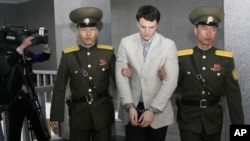U.S. student Otto Warmbier’s tragic death Monday, after being released from a North Korean prison in a coma, has again put an international focus on the widespread human rights violations allegedly being committed by the Kim Jong Un government.
“This is a government that frankly is a human rights abomination. It is a human rights black hole,” said Phil Robertson, the Deputy Asia Director at Human Rights Watch.
In January of 2016, Warmbier was arrested in Pyongyang for allegedly attempting to steal a propaganda poster at a hotel. He was sentenced to 15 years hard labor, then fell into a coma 15 months ago from which he never awoke.
North Korean officials said the 22-year-old American university student contracted botulism while in custody and was given a sleeping pill that put him into a comatose state. Doctors at the hospital in Cincinnati, where he was being treated after being released, discounted the North Korean account but could not say what caused the severe neurological injury.
"Unfortunately, the awful torturous mistreatment our son received at the hands of the North Koreans ensured that no other outcome was possible beyond the sad one we experienced today," the family said in a statement following his death.
Condolences and outrage
U.S. President Donald Trump offered his condolences to the family in a statement Monday saying, “There is nothing more tragic for a parent than to lose a child in the prime of life.”
The president also said the death deepens his determination to prevent future tragedies "at the hands of regimes that do not respect the rule of law or basic human decency.''
Other U.S. officials issued similar statements of sympathy for the family and outrage at what they described as Warmbier’s brutal, inhumane treatment by the North Korean government.
South Korean President Moon Jae-in issued a statement offering “condolence and consolation” to Warmbier’s family, and also condemned North Korea for detaining foreign nationals without regard for human rights guaranteed under international law.
“North Korea is still detaining our citizens and American citizens, and it needs to return them to their families immediately, and our government will put utmost effort for this,” said South Korean Presidential Office spokesman Park Soo-hyun.
There are six South Koreans currently imprisoned in North Korea. Some were missionaries who were charged with spying and others were reportedly kidnapped by North Korean agents while helping defectors on the Chinese side of the border.
U.S. officials have said they are concerned about three Korean-Americans who remain held in North Korea. The U.S. government accuses North Korea of using such detainees as political pawns. North Korea accuses Washington and South Korea of sending spies to overthrow its government.
Atrocities at home
“The North Korean regime also wages war on their own citizens,” said Marion Smith, the director of The Victims of Communism Memorial Foundation, in a statement on Monday.
A 2014 U.N. Commission of Inquiry (COI) report documented ongoing atrocities in North Korea comparable to those committed by Nazi Germany.
Among the findings:
* Between 80,000 and 120,000 political prisoners are currently detained in four large political prison camps.
*The use of torture is an established feature of the interrogation process.
*Persons who are found to have engaged in major political crimes are “disappeared,” without trial or judicial order, to political prison camps known as kwanliso.
*The inmate population has been gradually eliminated through deliberate starvation, forced labor, executions, torture, rape and the denial of reproductive rights enforced through punishment, forced abortion and infanticide.
*The policy of regularly carrying out public executions serves to instill fear in the general population.
“The ruling Kim Dynasty has shown time and time again that they have no regard for human rights. They have no regard for human life, and that whatever is necessary for them to hold onto power, they will do,” said Robertson.
Warmbier’s brutal treatment and tragic death, Robertson said, should motivate the international community to renew efforts to hold the Kim Jong Un government accountable for the widespread atrocities being committed in the repressive and opaque state.
Based on the 2014 COI report, the U.N. General Assembly passed a resolution to refer North Korea to the International Criminal Court for crimes against humanity, but the measure has since been stalled in the Security Council, where the North’s allies, China and Russia, are believed to be preventing any further action in this measure.
Youmi Kim in Seoul contributed to this report.
